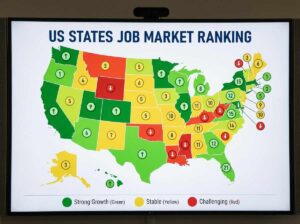Moving from one major city to another is a significant decision, and choosing between Los Angeles vs Seattle, involves weighing several factors. Both cities, nestled along the Pacific coast, offer vibrant lifestyles, diverse cultures, and unique opportunities, but they differ in climate, cost of living, job markets, and overall vibe. At Coastal Moving Services, we understand that relocating is more than just transporting belongings, it’s about transitioning to a new way of life. This article compares Los Angeles and Seattle across key aspects to help you decide which city aligns with your needs and preferences, backed by reliable data and insights.
Climate and Weather: Sunshine vs. Rain
One of the most striking differences between Los Angeles and Seattle is their climate. Los Angeles boasts a Mediterranean climate with over 280 sunny days annually, making it a haven for those who love warm, dry weather. Summers typically hover around 85°F, while winters rarely dip below 50°F, offering mild temperatures year-round. This climate is ideal for outdoor activities like beach visits or hiking in Griffith Park. However, the consistent sunshine can lead to drought concerns, and the city occasionally faces smog, particularly in inland areas.
In contrast, Seattle is known for its temperate, oceanic climate, characterized by mild summers and wet, overcast winters. The city sees about 149 rainy days per year, according to NOAA data, with drizzle being more common than heavy downpours. Summer temperatures average around 75°F, while winter highs are typically in the mid-40s. Seattle’s cloudy skies and frequent rain can feel dreary to some, but the lush greenery and mild temperatures appeal to those who enjoy a cooler, more temperate environment. If you’re moving from Los Angeles to Seattle, prepare for a wardrobe shift to include rain gear; if heading to Los Angeles, expect to embrace sunglasses and lighter clothing.
Los Angeles vs Seattle Cost of Living: Budgeting for Your New Home
Cost of living is a critical factor when choosing between Los Angeles and Seattle. According to Salary.com’s 2025 data, Seattle’s cost of living is approximately 5.2% lower than Los Angeles. Housing is a significant driver of this difference. In Los Angeles, the median rent for a one-bedroom apartment is around $1,363 per month, while a two-bedroom averages $1,752. Seattle, while still expensive, offers slightly lower rents, with a one-bedroom averaging $1,300 and a two-bedroom around $1,650. Home prices follow a similar trend: the median home price in Los Angeles is about $950,000, compared to $820,000 in Seattle, based on Zillow’s 2025 market analysis.
Beyond housing, other expenses vary. Los Angeles has higher electricity costs, ranking fifth among U.S. states, with a 2.63% price increase over the past year. Seattle benefits from lower electricity rates, down 1.6% in Washington state. However, Seattle’s public transit costs are slightly higher, with monthly passes averaging $99 compared to Los Angeles’ $80.
Grocery prices are comparable, but Los Angeles’ diverse food scene, from food trucks to Michelin-starred restaurants, can tempt higher dining expenses. Seattle’s focus on local seafood and coffee culture may influence your budget differently. Both cities rank among the worst for driving, with Los Angeles at 92 and Seattle at 96 out of 100 major U.S. cities for commute times, per Salary.com, so factor in gas and parking costs if you drive.
Job Market and Economy: Opportunities in Two Hubs
Both Los Angeles and Seattle are economic powerhouses with distinct job markets. Los Angeles, often called the “entertainment capital of the world,” thrives on its film, television, and music industries, with major studios like Universal and Warner Bros. driving employment. The city is also a growing tech hub, dubbed “Silicon Beach,” hosting companies like Google and SpaceX. According to the U.S. Bureau of Labor Statistics, Los Angeles’ unemployment rate is around 5.2%, reflecting a competitive but diverse job market. Opportunities in aerospace, fashion, and tourism further bolster the economy.
Seattle, on the other hand, is a tech and innovation leader, home to giants like Amazon, Microsoft, and T-Mobile. The city’s job market is robust, with an unemployment rate of approximately 4.8%, slightly lower than Los Angeles. Beyond tech, Seattle supports industries like healthcare, maritime trade, and sustainable energy. For professionals in creative fields, Los Angeles may offer more opportunities, while Seattle is ideal for tech and engineering roles. Both cities offer comparable salaries for similar roles, though Seattle employers pay about 1% less on average, per Salary.com.
Culture and Lifestyle: Vibrant Diversity vs. Laid-Back Innovation
Los Angeles and Seattle offer distinct cultural experiences. Los Angeles is a melting pot, with a diverse population shaped by its proximity to Hollywood and global influences. Neighborhoods like Koreatown and East Los Angeles reflect rich cultural heritage, and the city’s food scene, from taco trucks to high-end sushi at n/naka, is unmatched. The nightlife is electric, with venues ranging from rooftop bars to live music in Silver Lake. However, the city’s sprawl and traffic can make socializing feel fragmented, and some describe Angelenos as opportunistic rather than warm.
Seattle, by contrast, has a more laid-back, community-oriented vibe, though some note a “Seattle Chill” where newcomers may find it harder to form connections. The city’s culture is tied to its natural surroundings, with outdoor activities like kayaking and hiking in nearby Mount Rainier National Park being popular.
Seattle’s food scene emphasizes fresh seafood, with iconic spots like Pike Place Chowder, and its coffee culture is legendary, thanks to Starbucks and local roasters. Neighborhoods like Capitol Hill offer an artsy, eclectic feel similar to Los Angeles’ Silver Lake, but Seattle’s smaller size makes it feel more cohesive.
Moving Logistics: Planning Your Relocation
The 1,134-mile move between Los Angeles and Seattle is a significant undertaking, typically taking two to eight days depending on the method. Full-service moving companies charge between $2,000 and $9,640, with costs varying by home size and services like packing or car shipping, according to moveadvisor.com.
For a one-bedroom home, expect $2,531–$3,880, while larger homes (four bedrooms or more) can cost up to $11,086. long-distance moving containers, like those from PODS, offer a cost-effective alternative, averaging $2,000–$4,000, where you pack and load, but the company handles transportation. Renting a truck for a DIY move is the cheapest option, starting at $765, but requires you to handle all driving and labor.
At Coastal Moving Services, we recommend researching licensed movers through the Federal Motor Carrier Safety Administration (FMCSA) at fmcsa.dot.gov. Ensure your mover offers insurance options, such as Released Value Protection (included at no cost, covering items at 60 cents per pound) or Full Value Protection for added security.
Submit a change of address with USPS at least a week before your move via usps.com to ensure mail forwarding.
Making Your Decision: Which City Suits You?
Choosing between Los Angeles and Seattle depends on your priorities. If you crave sunshine, a bustling entertainment industry, and a diverse, fast-paced lifestyle, Los Angeles is a strong contender. If you prefer a cooler climate, a tech-driven economy, and a nature-centric community, Seattle may be your ideal home.
Both cities offer unique advantages, but their differences in weather, cost, and culture are significant.
At Coastal Moving Services, we’re here to make your transition smooth, whether you’re heading north to Seattle or south to Los Angeles. Contact us at +1-334-659-1878 to start planning your move today.
long distance moves
as low as $1748
Long-distance moving all across the United States. Experienced and insured, residential and commercial.
4.9/5 AVERAGE RATING










